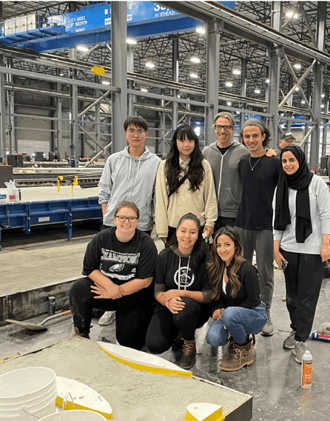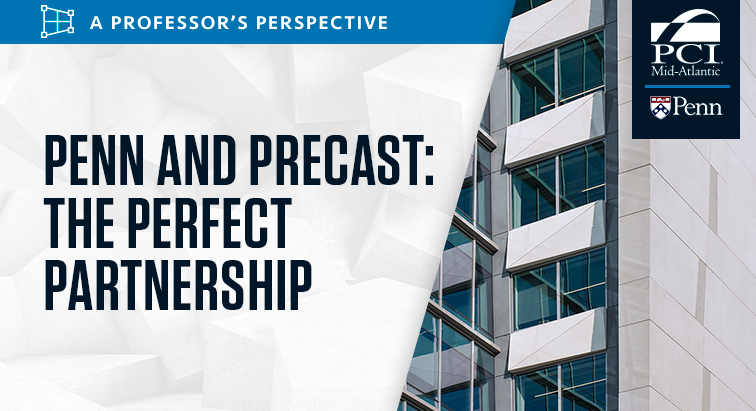Penn and Precast = Perfect Partnership
By Richard Garber, AIA, Weitzman School of Design Department of Architecture, University of Pennsylvania, and Dawn Decker, Executive Director, PCI Mid-Atlantic
Concrete is an ancient material, but the interest in sustainability, prefabrication, and diverse building materials has renewed its appeal. Current students are aware of conserving the use of materials and are interested in reducing our carbon footprint, and there is a larger movement in architectural programs to look at modularity, prefabrication, and energy use.
For years, the Department of Architecture at the University of Pennsylvania’s Weitzman School of Design, and Northeast Precast (NEP), a leading precast manufacturer located in Vineland, New Jersey, have worked together to connect academia with industry. As a result, the “Matter Making and Testing: Designing with Next Generation Precast Concrete” has been an over-enrolled seminar since its inception in the fall of 2019.
“Working with precast encourages us to think of ways to address problems of our time.” – Richard Garber, AIA, Lecturer, University of Pennsylvania
Last fall, “Matter Making and Testing,” through monies provided by our first year as a PCI Foundation grantee, engaged students in Ultra High‐Performance Concrete (UHPC), challenging students to design precast panels of minimum thickness and non‐standard shape grammars. Student teams were provided a 5x10 1/8” thick piece of sheet steel, which they used to create formwork for the casting of two (2) panels. In addition to the sheet steel, which was cut and formed using NEP’s state-of-the-art CNC plasma cutters at their Vineland, New Jersey plant, students were able to use foam inserts, which were milled at Penn facilities.
We conducted three (3) day trips to NEP’s plant; the first, in late September 2022, served as an introduction to NEP’s facilities and team; and the second, in early November, was our pour day. The time between saw a flurry of intensity, with student‐NEP teams designing panels, formwork, and the workflow that would produce both. While much of the fabrication of formwork occurred in the time leading up to pour day, all students were present to do the final formwork assembly, including fastening, caulking, and general preparation. Students also mixed the UHPC and poured the panels with NEP project managers. The final visit was at the beginning of December for final student presentations and the panel “reveal” —no images of the final panels were shared with the students, so their first interaction with their work was that day at the plant. Guests for the final presentation included Peter Finsen, FPCI, University of Pennsylvania graduate and former PCI Foundation board of trustee, and Penn faculty members Ezio Blasetti and Drew Busmire.

Fall 2022 Matter Making and Testing Master of Architecture and robotics program students and Northeast Precast Project Managers, Northeast Precast, Vineland, New Jersey. Photo: Richard Garber
“The Matter, Making, and Testing: Designing with Next Generation Precast Concrete’” seminar is the most informative and personally rewarding course I had the opportunity to take in my graduate architecture education at the University of Pennsylvania. Due to the nature of collaboration required to be successful in the course, it created and offered a highly realistic working relationship between the students and the precast teams at Northeast Precast, simulating the real-world dynamic that occurs between architects and subcontractors in the design and construction of a project.”
What’s next for this industry and university collaboration?
The single largest takeaway we hear is that the students absolutely cherish the ability to make something and be involved in a design‐build process. The time we spend in the precast plant is so eagerly anticipated by the students, and they generally come highly prepared for the opportunity. Each of our PCI‐affiliated courses are structured with different learning objectives and final deliverables, and in each, there is a sort of positive negotiation that occurs between the students and the precast plant. In other words, the courses are two-way explorations in material research and making – and there is a knowledge transfer in which both students and the precast engineers to learn from one another. This has been one of the more rewarding aspects of the courses we have held.
The collaboration between Northeast Precast and the University of Pennsylvania Weitzman School of Design was profiled by the Precast/Prestressed Concrete Institute (PCI) in the Ascent publication Fall 2022 issue “Industry and Academia Unite.” Click HERE to read the full article.
Richard Garber, AIA, is a founding partner of GRO Architects. The work of the practice privileges the integration of emerging technologies to respond to client needs, project complexity, and collaboration between disciplines. GRO received the 2022 Honor Award, Residential Category in the annual AIA New Jersey Design Awards Competition for Nest, a 122-unit micro-housing project in Jersey City. Richard has written numerous books and essays in which he advocates for technology as it relates to formal speculation, simulation, manufacturing, and building delivery to generate innovative design, assembly, and construction solutions. His newest book, Building Futures: Technology, Ecology, and Practice, was published by Wiley in September 2023. He holds a Bachelor of Architecture from Rensselaer Polytechnic Institute and a Master of Science in Advanced Architectural Design from Columbia University’s Graduate School of Architecture, Planning and Preservation. Richard teaches design studios and seminars in the Master of Architecture program at the University of Pennsylvania Weitzman School of Design.
Want to learn more about guest lectures, plant tours, and other educational materials from PCI Mid-Atlantic? Reach out!
© 2023 Precast/Prestressed Concrete Institute Mid-Atlantic Chapter





